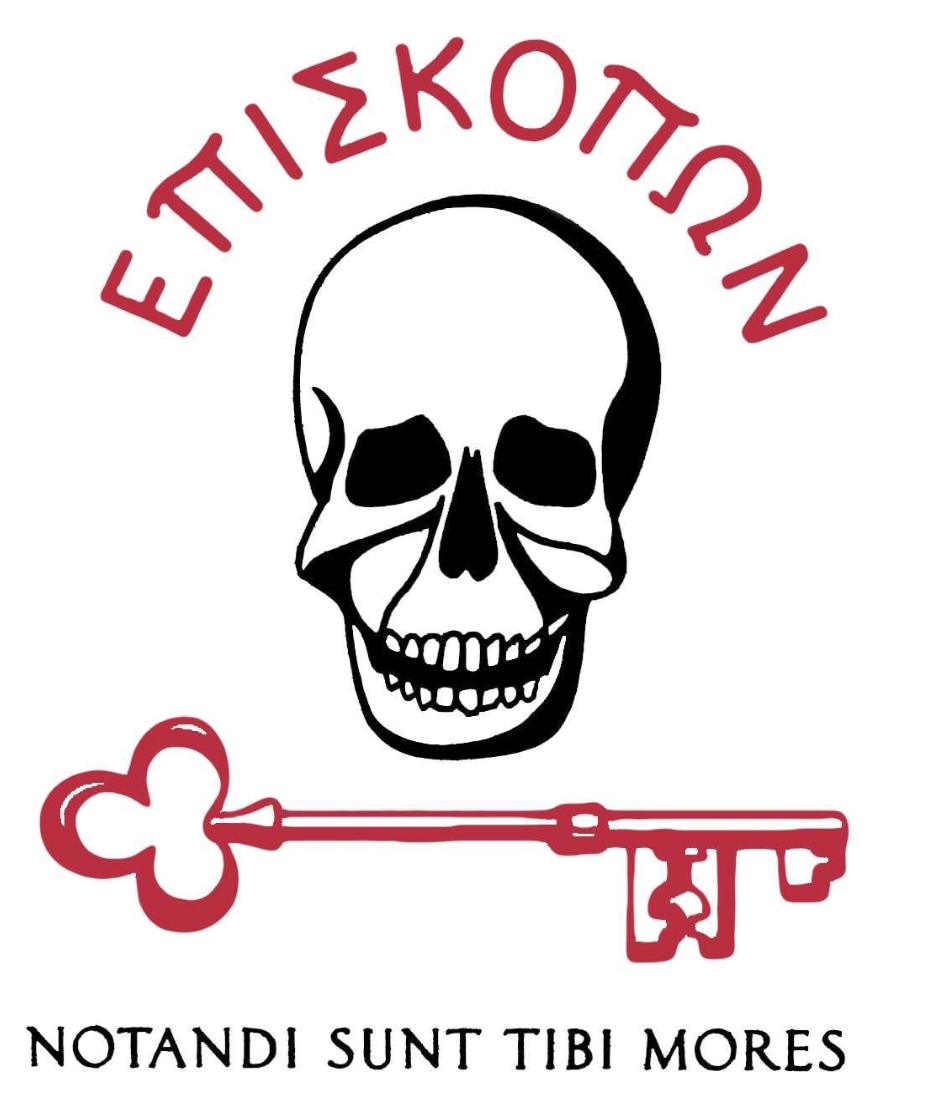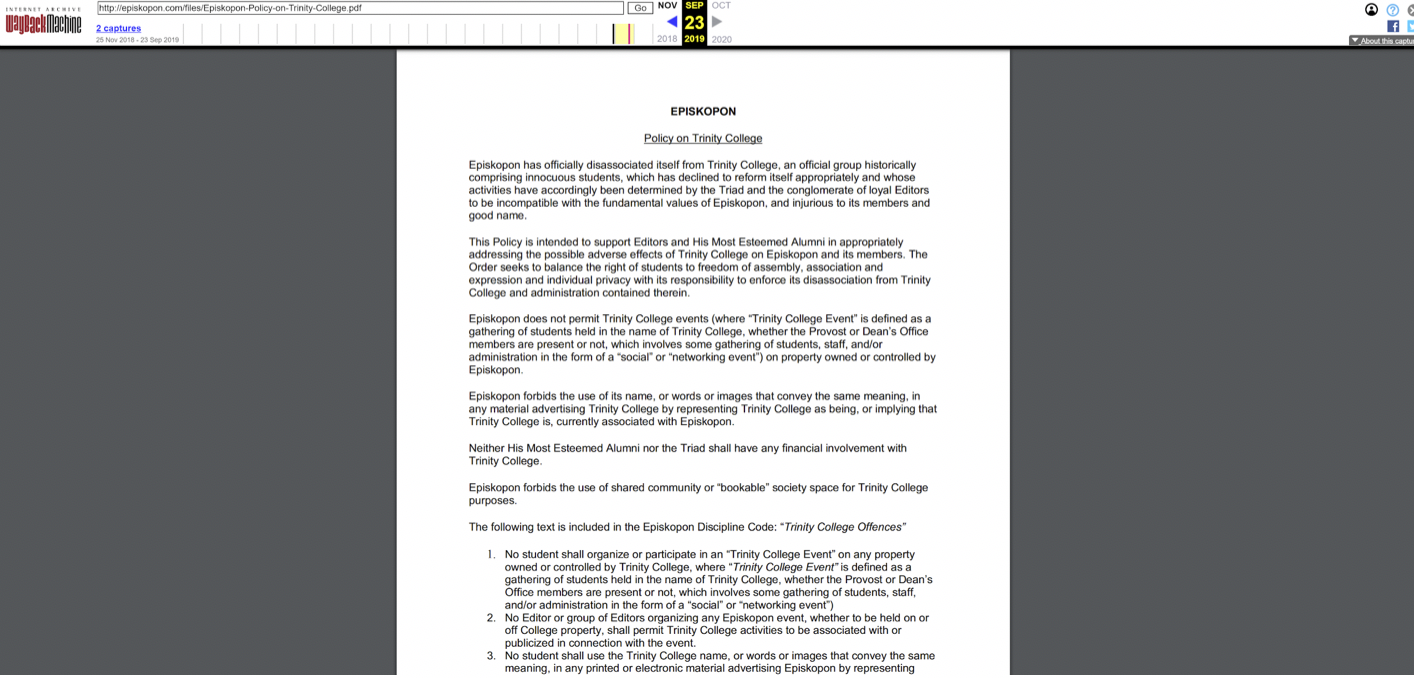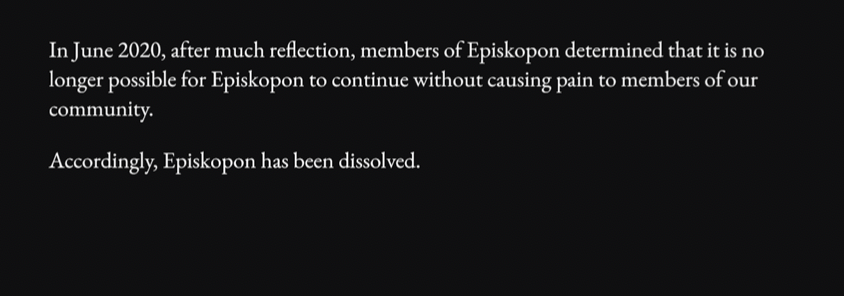A Brief History of The University of Toronto’s Worst and Worst-Kept Secret
BY: VAISHNAVY PUVIPALAN
Artwork via Wikimedia Commons
I think it’s safe to say that I’m far from alone in suffering socially as a student at UTSC. Some might say that feeling isolated from your peers is symptomatic of being a commuter or attending UofT. I think it has to do with the fact that I have a school spirit deficiency. Between the ceaseless Quercus notifications and compounding OSAP, I could not for the life of me muster an ounce of pep for this fine institution that I attend, and I was a cheerleader in high school.
It’s why I’m both baffled and impressed by the presence of social clubs on campus. Who are these kids that are investing so much of their time constructing an artificial social hierarchy? Do you all remember the opening scene of The Social Network? The movie starts with a fictionalized Mark Zuckerberg going on about his anxieties around getting into Harvard’s final clubs (specifically, the Porcellian Club or the Phoenix Club) to an annoyed and soon-to-be-ex-girlfriend.
“Teddy Roosevelt didn’t get elected president because he was a member of the Phoenix Club.” “He was a member of the Porcellian –and yes, he did.” / Photo via The New York Times
I wanted to know if we had an equivalent up here. There’s Greek life of course, but—and no offence to any brothers or sisters reading this—I mean something more exclusive and shrouded in mystery. And boy howdy, did I find something.
At this point, it seems pertinent to me to mention that in an alternate version of Fall 2018, I would’ve found myself a UTSG student at Victoria College. I didn’t put in nearly enough thought into choosing a college and the same goes for rejecting the admission offer. UTSC won out because I lived five minutes away from campus. It was only until later in the school year that I became curious about what could’ve been had I chosen to go downtown instead.
Victoria College (left) and Trinity College (right); my road not taken / Photos via Wikimedia Commons
I went down a rabbit-hole of trying to understand the system of seven colleges and the stereotypes and mythology associated with each. Honestly, I had a lot of fun with this. It felt a bit like reading the lore behind Hogwarts houses. I learned that of the seven, Victoria and Trinity colleges have a reputation for being populated by a particularly competitive and snobbish student body, probably owing to the higher admission requirements and residence fees.
Trinity’s image is additionally soured by a supposed elitist streak. This is what brings me to the matter at hand: the life and death of the University of Toronto’s only known (quasi-)secret society, Episkopon.
Dating as far back as 1858, an exclusive group of members from the St. George campus’s brightest and whitest college, Trinity, gather at Queen’s Park for a reading. The traditions of Episkopon (Greek for “bishop”) were, frankly, bizarre to me. These nights would entail an appointed Scribe leading the recital of satirical songs and poems, Latin and English, and reading from a newspaper, poking fun (or as they insist upon calling it, “providing gentle chastisement”) at the happenings in the student body. This is all of course coupled with copious amounts of alcohol in the name of the spirit of “The Venerable Father.” Here is audio from a reading that took place in 2007.
Sounds like a grand old time, sort of like a cult-y, artsy frosh party with a newspaper reading (I wish The Underground had parties like this). The club boasts some pretty powerful alumni who went on to be major figures in Canada’s political sphere: Minister of National Defence Bill Graham and Governor General Adrienne Clarkson.
The Honourable Bill Graham (left) and the Right Honourable Adrienne Clarkson (right) participated in Episkopon / Photos via Wikimedia Commons
All this seems like pretty benign fun at the surface, but Trinity has maintained the firm stance that the college is not affiliated with Episkopon since 1992—and for good reason.
A Google search for “Episkopon” will render result after result from news publications detailing how mired in controversy the group has been since around the 1980s, right up until the summer of 2020. For a student society that purported to be centered around light-hearted ribbing, it has an extensive history of being downright sinister to its members and critics alike.
An article from a 1993 volume of The Varsity includes a short list of controversial events linked to Episkopon from the years prior. For instance, in 1989, “During an Episkopon orientation event, first-year men were told to describe how they would date rape the Trinity women they had met that week. They were then forced to kiss and suck a dildo that was covered with shaving cream and lodged in the mouth of a skull while Episkopon members shouted ‘fag’ and ‘deep throat it.’” Pretty fucked up. In 1991, “A bucket of human feces and urine was dumped in the room of Farhan Memon, Episkopon’s most vocal critic.” Worst yet, the group has been linked to the suicide of a student outed without consent.
And it didn’t stop in the 90s either. Even until this very year, the group has perpetuated a culture of bullying and intimidation, of racism and homophobia in Trinity College.
I couldn’t help but want to know more about Episkopon (also known as Pon). Just what kind of cutting-edge works did they feel the need to so fiercely protect and dress in so much fanfare and hazing? I consulted the Wayback Machine to look at versions of the official website over the years:
The spooky entrance to Episkopon’s main page in the year 2000. Notandi Sunt Tibi Mores is a verse by Roman poet Horace translating to “The manners of men are to be carefully observed.” Even worse than early 2000s web design is having a Greek name and a Latin motto, you Philistines / Photo via The Internet Archive
A tongue-in-cheek FAQ section criticizing the Provost and all of Episkopon’s decriers, citing conspiracy; also a plea to have an open mind / Photo via The Internet Archive
More recent versions of the site give better insight into the group’s approach to comedy:
A 2019 homepage to the revamped Episkopon website; the “Alumni” tab links to the Cabinet of Justin Trudeau and “Residence Fees” links to the OLG website / Photo via The Internet Archive
The comedy isn’t totally lost on me, all right? I can see that the people behind this were clearly very creative and capable of self-awareness. But any entertainment value is ruined by the complete refusal to acknowledge the trauma they’ve inflicted.
One of the site’s links leads to this direct parody of Trinity College’s (entirely reasonable) policy on Episkopon / Photo via The Internet Archive
I’m happy to say that measures are being taken at Trinity College to further distance itself from Episkopon and to make it a safer space for everyone. For instance, students belonging to the group resigned from executive positions at the Trinity College Meeting. Well, I shouldn’t say I’m happy that these things have to happen, I’m left feeling more hollow than anything. You know, when you find out your school has had a historical secret society, you hope it’s something cooler than a bunch of assholes terrorizing the student body.
If you go to Episkopon.com right now, this is what you’ll find:
Good riddance / Photo via Episkopon.com
I’ve never been particularly adept at discerning sincerity from sarcasm on the internet. But I’m doubtful this is a reflection of true remorse. What I want to ask these guys is, was it worth it? Was this a tradition that absolutely needed preservation a century later?
Surely, in-group psychology has something to do with this whole ordeal, the desire to fit in is a strong one. So, I’m cautiously sympathetic of anyone who had been unwittingly roped into this mess. Ultimately, I’m just glad that nothing like this goes on at my lowly satellite campus. If this is what it means to be one of the beautiful people, I’ll gladly pass.
Episkopon is just a rip-off of The Cephalopod Lodge from Spongebob smh.









